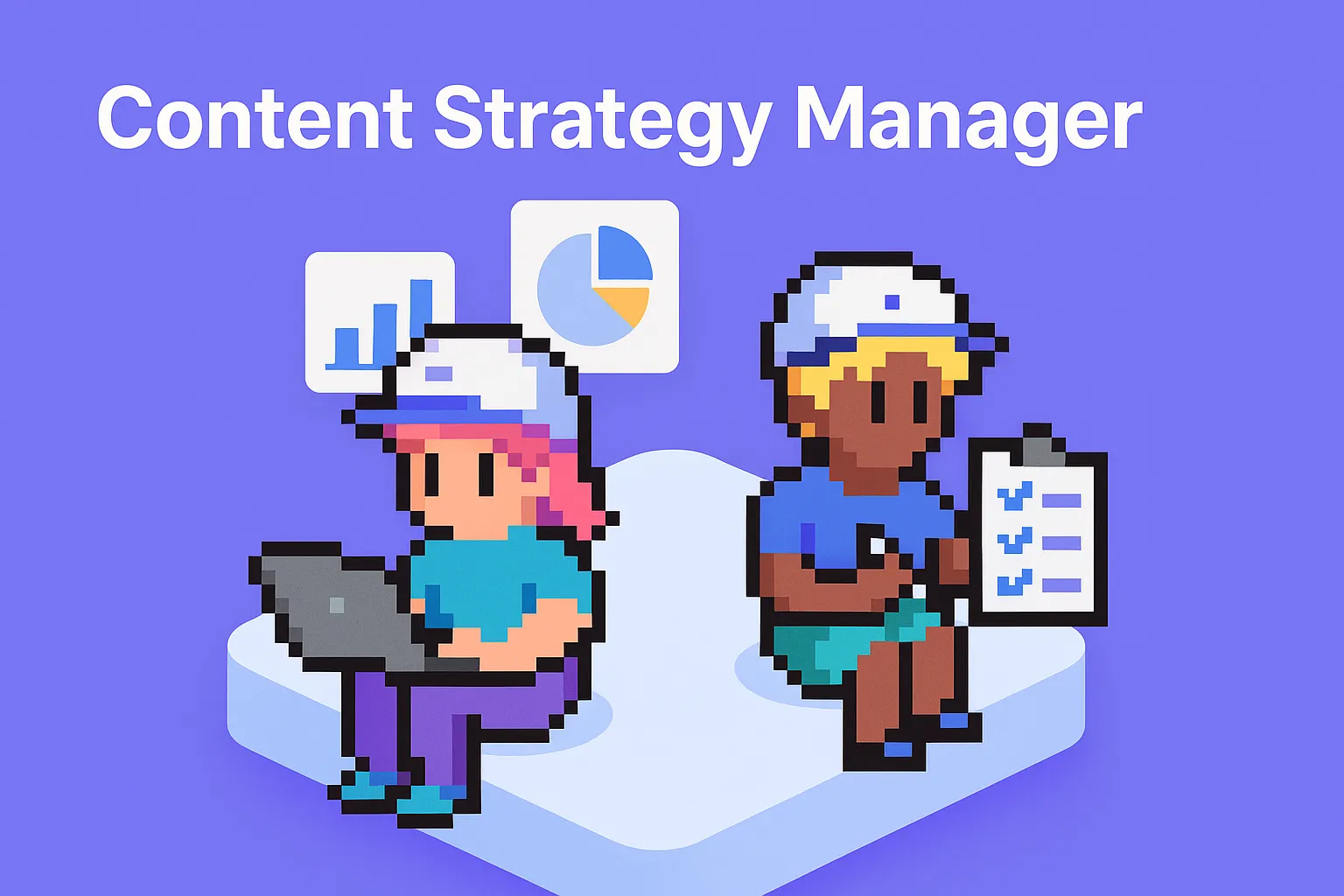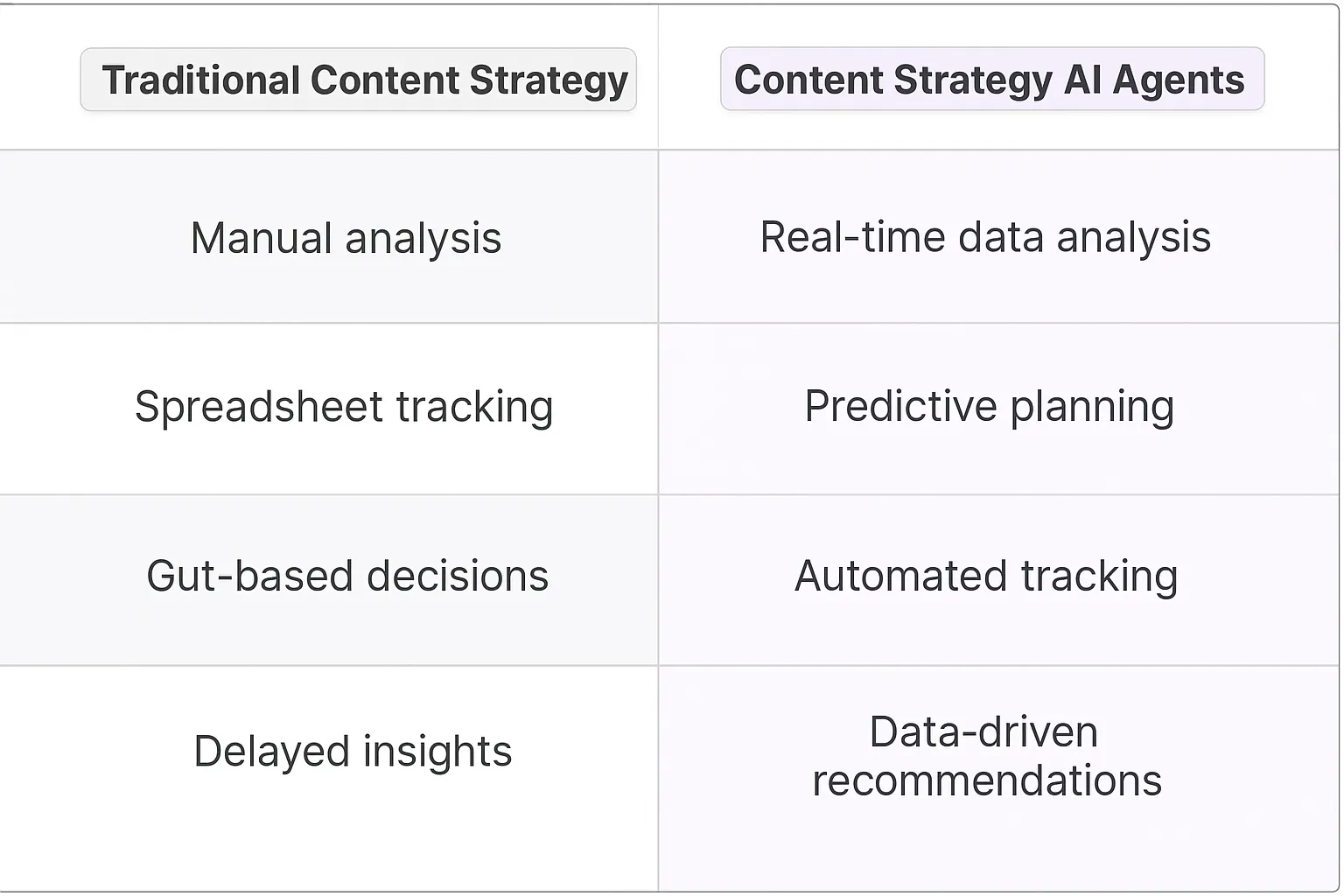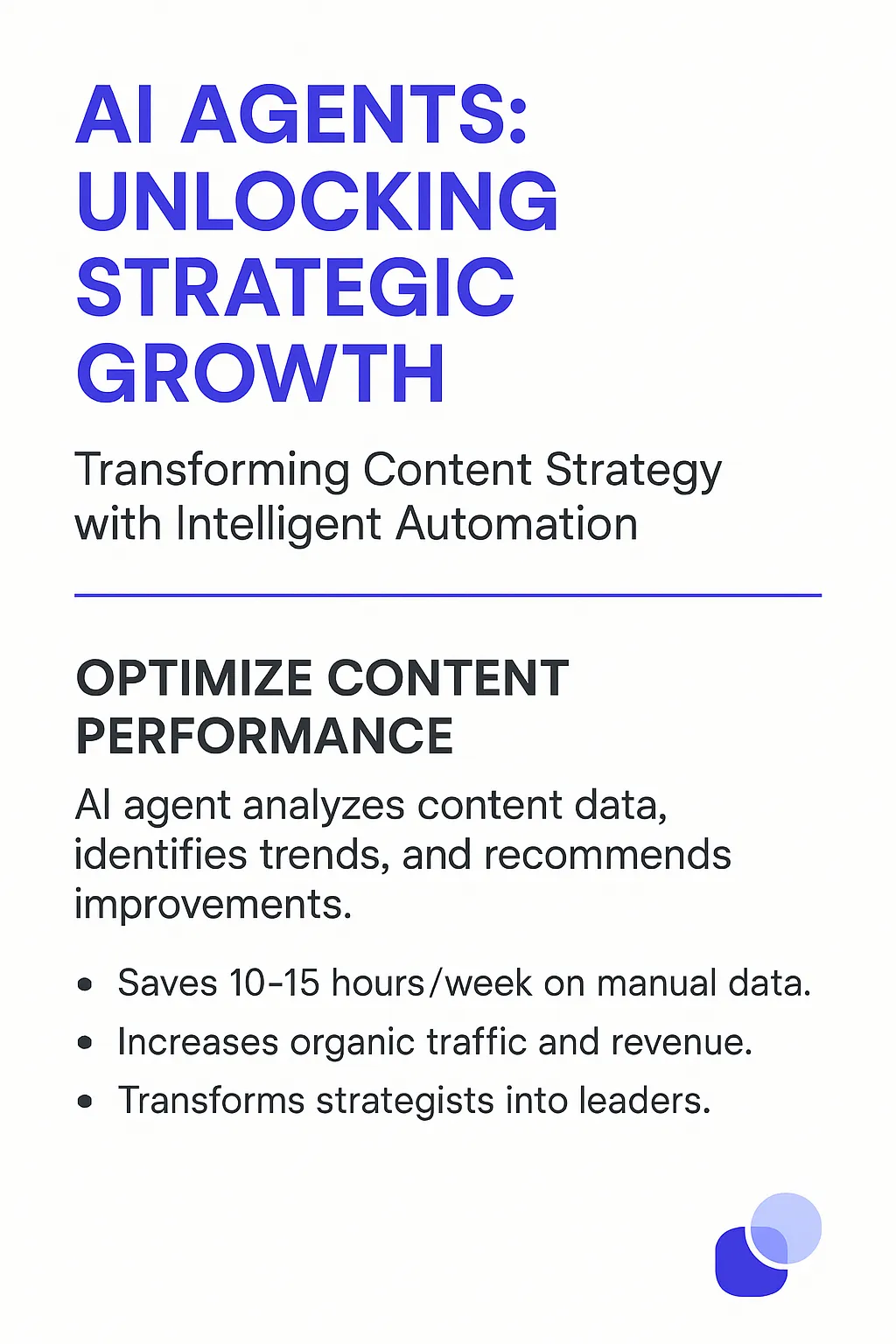Content Strategy Manager is an AI-powered system that works alongside content teams to analyze, optimize, and scale content operations. It processes vast amounts of data to identify content opportunities, track performance, and predict audience behavior patterns. Unlike traditional content tools, it learns from your content ecosystem to provide increasingly sophisticated insights and recommendations.

Content strategy managers traditionally relied on a complex web of disconnected tools and manual processes. They'd spend hours in spreadsheets tracking content calendars, juggling multiple SEO tools, and manually analyzing performance metrics. The real pain point? Context switching between Google Analytics, keyword research platforms, and content management systems while trying to maintain a coherent strategy across channels.
Teams would often hit bottlenecks waiting for approvals, feedback cycles, and performance data to inform their next moves. The result was a fragmented approach where valuable insights got lost in the noise of day-to-day operations.
AI Agents fundamentally transform how content strategy managers operate by serving as digital teammates who understand both content and context. They can analyze vast amounts of performance data, identify trending topics, and suggest content opportunities - all while maintaining your brand voice and strategic objectives.
The game-changing element is their ability to learn from your existing content ecosystem. These agents can identify which pieces resonate with specific audience segments, predict content performance, and automatically adjust scheduling based on engagement patterns. They're essentially pattern-recognition machines that get smarter with every piece of content you produce.
For content distribution, AI Agents excel at multi-channel optimization. They can adapt content formats and messaging for different platforms while maintaining consistency in your brand narrative. This means you're not just creating content - you're creating smart content that knows where and when it will perform best.
The most compelling benefit is how AI Agents handle the feedback loop. They continuously monitor performance metrics, audience reactions, and market trends, providing real-time insights that inform your strategy. This creates a dynamic content ecosystem that evolves with your audience's needs and behaviors.
What's particularly powerful is their ability to scale personal attention. While human strategists can deeply understand a handful of audience segments, AI Agents can analyze and respond to thousands of micro-segments, ensuring your content strategy remains relevant across your entire audience spectrum.

Content strategy is experiencing a fundamental shift. Digital teammates are now capable of processing vast amounts of content data to identify patterns that humans might miss. They're particularly effective at finding correlation between content performance and user behavior, enabling content teams to make more informed decisions.
The real power comes from combining quantitative analysis with qualitative insights. These AI agents can process thousands of content pieces, identify what drives engagement, and suggest content themes that resonate with specific audience segments. This creates a feedback loop where each piece of content becomes smarter and more targeted.
For content strategy managers, this means moving from gut-based decisions to data-informed strategies. The AI agents serve as analytical partners, handling the heavy lifting of data processing while allowing humans to focus on creative direction and strategic thinking.
Success with content strategy AI agents requires a clear implementation framework. Start with one core process, like content gap analysis or performance tracking. Once that's running smoothly, expand to more complex applications like predictive content planning or automated content briefs.
The key is maintaining human oversight while leveraging AI capabilities. Content strategy managers should view these tools as analytical partners that enhance their decision-making rather than replace their strategic judgment.

Content Strategy Manager AI agents are transforming how brands and publishers approach their content operations. Drawing from my experience working with growth teams and content organizations, I've observed these digital teammates becoming integral parts of modern content teams. They're not just tools - they're strategic partners that help content leaders make data-driven decisions while maintaining creative excellence.
The versatility of AI agents in content strategy management makes them valuable across various industries. Media companies use them to analyze content performance and spot trending topics before they peak. E-commerce brands leverage them to maintain consistent voice across thousands of product descriptions. B2B companies employ them to turn complex technical documentation into engaging thought leadership.
What's particularly fascinating is how these AI agents have evolved from basic content optimization tools into sophisticated strategic partners. They now help content teams identify content gaps, predict audience interests, and even suggest novel content angles that human strategists might overlook. This shift represents a fundamental change in how organizations approach content strategy - moving from reactive to proactive content planning.
The publishing world faces a fascinating paradox - they're drowning in content but starving for strategic direction. I've seen this firsthand working with media companies. A Content Strategy Manager AI agent transforms how publishers approach their editorial calendars and content distribution.
Take Condé Nast's digital properties as an example. Their teams juggle dozens of publications, each producing 20-30 pieces daily across multiple platforms. The Content Strategy Manager analyzes performance data, audience behavior patterns, and competitive intelligence in real-time - something that would take a human team weeks to process.
The AI agent identifies precise content gaps and opportunities by:- Tracking seasonal trend patterns across a 5-year window- Mapping content performance against audience segment behaviors- Analyzing competitor content velocity and engagement metrics- Monitoring social sentiment around specific topics
What makes this particularly powerful is the agent's ability to synthesize these insights into actionable recommendations. For instance, it might detect that readers of Architectural Digest show 3x higher engagement with renovation content during fall months, specifically when combined with sustainability angles. The agent then automatically adjusts the editorial calendar to capitalize on this pattern.
The results speak for themselves. Publishers using AI content strategists typically see a 40-60% increase in content engagement rates and a 25% reduction in content production costs. But the real magic happens in the long tail - these systems get smarter over time, building an increasingly sophisticated understanding of what works for specific audience segments.
This isn't just about optimization - it's about fundamentally changing how publishers think about content strategy. The AI agent becomes a strategic partner in content planning, allowing human editors to focus on creativity and storytelling while ensuring their work reaches the right audience at the right time.
I've spent years studying how e-commerce brands scale their content operations, and there's a clear pattern emerging. The most successful companies are moving beyond basic product descriptions to build entire content ecosystems. Content Strategy Manager AI agents are becoming the secret weapon in this transformation.
Let's look at how a major beauty retailer implemented this approach. With over 15,000 SKUs and multiple customer segments, their content team was struggling to maintain consistency and relevance across their digital touchpoints. The Content Strategy Manager AI agent analyzed their historical data and uncovered some surprising insights.
The AI agent orchestrates content strategy by:- Correlating product purchase patterns with content consumption- Identifying high-converting content formats for different customer segments- Predicting seasonal content needs based on historical sales data- Mapping customer journey touchpoints to content gaps
What's fascinating is how the AI agent adapts content strategy based on real-time customer behavior. For example, it discovered that customers who read how-to content about skincare routines in the morning were 4x more likely to purchase premium products. The system automatically prioritized this content type during peak morning hours.
The numbers tell an interesting story. The beauty retailer saw a 75% increase in content-attributed sales within six months. More importantly, their content team reduced production time by 35% while maintaining higher quality standards. The AI agent helped them shift from a quantity-first approach to a strategic content operation.
This represents a fundamental shift in e-commerce content strategy. Instead of throwing content at the wall to see what sticks, these digital teammates enable precise, data-driven content decisions that directly impact the bottom line. They're not replacing creative teams - they're empowering them to focus on what matters most: creating compelling stories that drive sales.
Content Strategy Manager AI agents require sophisticated natural language processing capabilities to truly understand brand voice, content goals, and audience needs. The initial training period demands extensive datasets of your existing content, style guides, and performance metrics. Many organizations struggle with fragmented content repositories and inconsistent metadata, making it difficult for the AI to build accurate content models.
While AI agents can generate and optimize content at scale, maintaining consistent quality requires careful human oversight. The AI may miss subtle brand nuances or cultural context that could impact content effectiveness. Setting up proper review workflows and feedback mechanisms helps refine the AI's output over time, but this process requires significant upfront investment in training and calibration.
Content teams often experience resistance when introducing AI agents into their workflow. Writers and editors may feel threatened or skeptical about AI-generated content. Success requires clear communication about how the AI augments rather than replaces human creativity. Teams need time to develop trust in the AI's capabilities while learning to effectively collaborate with their digital teammate.
Content strategy often involves sensitive information about product roadmaps, campaign plans, and audience insights. Organizations must carefully evaluate how AI agents handle and store this data. Implementation requires robust security protocols and clear guidelines about what information the AI can access and process.
Quantifying the ROI of a Content Strategy Manager AI agent presents unique challenges. Traditional content metrics may not fully capture the AI's impact on workflow efficiency and content quality. Organizations need to develop new frameworks for measuring success that account for both quantitative outputs and qualitative improvements in content strategy execution.
Beyond the initial investment in AI technology, organizations must allocate resources for ongoing maintenance, updates, and optimization. This includes dedicated team members who understand both content strategy and AI capabilities to serve as bridges between the technology and content teams. The total cost of ownership often exceeds initial expectations.
Content Strategy Manager AI agents represent a fundamental evolution in how organizations approach content strategy. The technology's ability to process vast amounts of data while providing actionable insights creates new possibilities for scaling content operations. While challenges exist in implementation and adoption, the potential benefits - from increased engagement to improved ROI - make this a compelling solution for modern content teams. The key to success lies in viewing these AI agents not as replacements but as powerful digital teammates that enhance human creativity and strategic thinking.